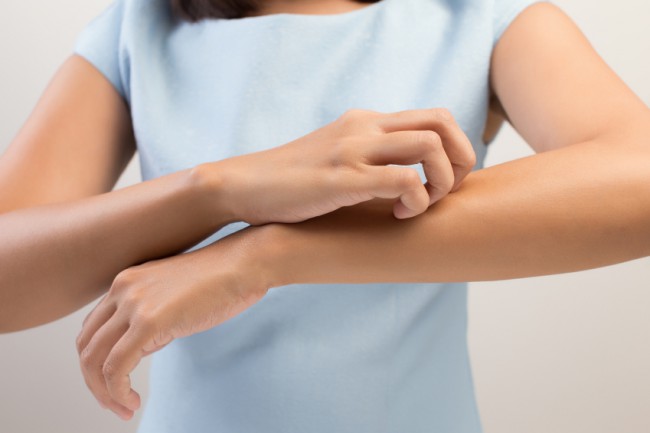Sometimes, a simple tingle can turn into a vicious itch. You can scratch and scratch the spot to no avail. In agony, and desperate for relief, you might wonder if it’s at all possible to claw off your own skin; that’ll make the itching stop. Unfortunately, scratching is not the solution. Our hands and nails are covered in dirt and bacteria which can get embedded into the skin. Scratching will only cause the irritation to spread, worsen and, in some cases, become infected. Itchy friends, don’t fret — find out what could be the cause, then follow a few simple tips to learn how to resist the itch and relieve it for good!
When you have an itch that won’t quit:
Step 1: Don’t itch!
Step 2: Identify what’s causing the irritation/itch
Step 3: Calm the skin and reduce inflammation
Step 4: If you have a serious rash or are extremely itchy, contact your healthcare provider. You may need topical or oral medication, or both.
Possible causes for itchy skin:
Skin conditions: eczema, contact dermatitis, psoriasis, hives, etc.
Skin conditions like eczema can pop up in infants and adults and are typically conditions that come and go. The itching usually affects a specific area and shows other signs such as redness, inflammation, bumps, pustules and blisters. Reducing the irritation is important to prevent swelling and long-term damage. Topical hydrocortisone creams are a good starting point for OTC treatments. If things don’t improve or worsen it may be time to contact your regular health care provide for a topical antibiotic.
Dry skin: If your skin tends to be on the dry side and suddenly it starts itching, it’s likely due to the condition of your skin. Dry types tend to experience itchy skin because the barrier function of the skin is disrupted, causing moisture and essential nutrients to become depleted. To keep the skin balanced, incorporate a gentle exfoliator into your regular routine. Removing the built-up dead skin cells will help your other moisturizing products work more effectively. Use the Fruit Enzyme Scrub with dual skin polishers and dissolving enzymes to quickly exfoliate dead skin cells and unwanted debris in pores. Super-smooth jojoba beads and refined bamboo stem powder gently polish the skin without irritating or tearing the surface. Use it 2-3 times per week to smooth away dulling debris.
Once a day, apply a rich hydrator, like the Deep Repair Cream with EGF peptides that increase cellular regeneration while algae-derived Venuceane™ protects collagen and prevents moisture loss. Nourishing shea butter and cutting-edge skin nutrients restore moisture while improving skin’s texture and youthfulness.
Pregnancy: Some expectant mothers experience itchy skin, especially on the belly, thighs, and breasts. Blame the hormones! Also, as the skin stretches and pulls, dryness and irritation can occur. Itchy skin conditions, such as dermatitis, can worsen during pregnancy, so keep an eye on what’s taking place and monitor our condition with your doctor. To alleviate the discomfort, apply lightweight hydrators like organic coconut oil or argan oil directly to the skin to hydrate and condition. MyChelle’s Advanced Argan Oil contains both certified organic argan oil and baobab oil, which floods rich moisture, essential fatty acids and vitamin E into the skin.
Tips to Resist the Itch:
- Try a DIY Oatmeal bath: For centuries, oatmeal baths have been recommended as a way to relieve skin irritation and itchiness. All you’ll need is a blender, food processor or coffee grinder and 1 cup of oatmeal. You can use any unflavored instant oatmeal, quick oats or slow cooking oats. Process the oats on the highest setting until you have an ultra-fine powder. Sprinkle the oatmeal into your bath and soak for 15-20 minutes. When finished, pat dry with a soft towel rather than rubbing.
- Slather your skin in a rich, unscented moisturizer immediately after showering or bathing.
- Apply a cold compress directly to the area to relieve discomfort.
- Wear loose fitting, smooth cotton clothing over troublesome areas.
- Call your doctor if conditions worsen or do not improve.
What Not to Do:
- Avoid hot showers and baths, which can dry out your skin and make the itching worse.
- Avoid going out in the middle of the day, since heat can intensify the itching.
- Stay away from heavy fragrances and scented body/face products which can lead to sensitives and itching.
- Avoid substances that are known to irritate your skin or that cause an allergic reaction.
- Do not scratch!

